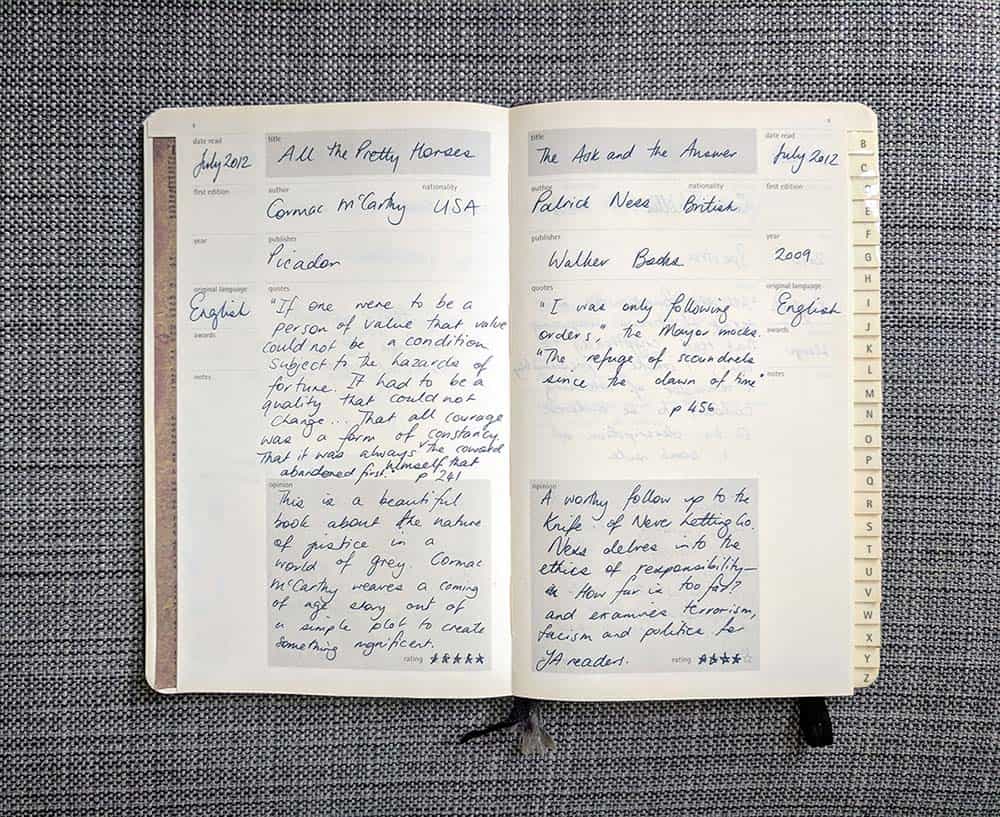Reviewing a book can seem like a daunting task. You need to summarise hundreds of pages into one concise piece, usually only five hundred words.
I’ve written countless reviews and literary essays over the years, with publications in genre fiction magazines and books. I’ve even won awards for my reviews.
So in this post, I’ll take you through the process of how I write a book review. But if there’s one thing you take away today, it’s this.
In the end, a book review is an essay that answers a single question: Why should you read (or not read) this book?
Everything else flows from this single question.
Keeping that in the back of your mind, I’ll take you through my process.
Take lots of notes while you read
The first part of the process happens while you read the book. It’s so important to take lots of notes while you read the book.
I’ll be highlighting passages in my Kindle or marking up pages with post-it notes and highlighters. But more than that, I take pages of notes as I read in my reading journal. I write thoughts as they come to me, significant passages, notes on the themes and overarching story. I also jot down points of confusion or frustration. They don’t have to be full sentences – often I mark down fragmentary dot points.
These notes are vital for when I write the review, because by the time I start, I have a fairly good idea of what I’m going to say and how I’ll structure it.

How to structure your book review
I have a basic structure for any review I keep in the back of my mind.
- Introduction
- Story summary
- The argument, balancing positive and negative criticism
- Conclusion
Introduction
The introduction should identify:
- What book is being reviewed
- The book’s genre and where it sits in the wider market
- The overall tone of the review (positive, negative, or middling, humorous or serious)
But that doesn’t mean it has to be boring!
The introduction starts with a hook to draw the reader in. What’s a hook you ask? It’s a catchy line that’s going to make the reader want to read your review. For example, this is the hook I used in my essay on Charles Beaumont’s ‘The Howling Man’.
Forget shagging backpackers and pot smoking fogies, the Abbey of St. Wulfran’s is quite possibly the worst literary hostel in the world.
Here’s another example from my review on Pride and Prejudice and Zombies, which riffs off the immortal line from Jane Austen’s novel (minus the zombies).
‘It is a truth universally accepted that a zombie in possession of brains, must be in want of more brains.’
So begins the immoral, the blasphemous, and enormously entertaining Pride and Prejudice and Zombies, by Seth Graheme-Smith (and of course, Jane Austen). If the original story wasn’t enough for you, throw in a dojo of ninjas, a couple of beheadings, and hoards of zombie undead, and you have a book worthy of the shelves of Pemberley. Or not.
Story summary
After the introduction, I provide a short story summary, although I’m careful to avoid spoilers. This is often similar to a book blurb. It’s enough story to provide context for the reader, but not so much that your review gets bogged down in descriptions. It’s usually only a paragraph.
One of the biggest mistakes I see in book reviews is that people just describe what happens in the book. It’s not a synopsis, it’s a review.
Return to the key question: Why should you read (or not read) this book?
The argument
From the brief story summary, I delve into the argument. I treat a book review like an essay, arguing both sides of why you should or shouldn’t read the book. There’s no one way to structure the argument – the questions below provide a starting point, not a definitive list to answer in order.
For both fiction and non-fiction books, ask yourself:
- Is this book important or memorable? Why?
- How does this book engage with the wider world and current events?
- What makes this book unique?
- Where does this book sit compared to others in the genre?
- How could this book be improved?
- Does this book represent my lived experience well?
- Is the book accurate?
- How does this book make you feel?
- Who should read this book?
Once I’ve thought about those questions, I’ll look at how the sections could flow one into the other.

Compiling the feedback sandwich
From there, I structure the argument, often highlighting the positive aspects of the novel first, before delving into areas of criticism.
It’s important to remain balanced and fair. I’m a writer as well, and I’d hate to get a purely negative review slamming my book. It’s also why it’s vital to provide specific examples to back up your argument. It’s not enough to say, I didn’t like it. You need to show why.
For example, if a book includes poor representation of women, I might discuss a scene which illustrates that point, or how the female characters are portrayed, or the language with which they’re described. Or all three.
And even if you know the author personally, a book review is not the place to launch into a personal attack on the writer. In fiction, you can’t assume that the content of the story or the actions of the characters are the personal views of the author. Keep your criticism about the book and its contents.
Concluding a book review
In a conclusion, you summarise your thoughts on the book and whether the reader should read it. Don’t be wishy-washy! People read reviews to know if they should read it, and the last thing you want a reader to go away with is uncertainty. Often I’ll recommend the book to certain audiences – if you’re a fan of a certain author or book, you’ll like this.
This is also where I include lines I think would make great quotes on a book cover (okay, so I’m yet to have one of my review quotes in a book, but life goals!). Be firm and declarative. Your opinion matters.
More tips for writing a book review
While that’s my general structure for writing a book review, there are a few more important tips to keep in mind as you write.
Write the review soon after finishing the book
While you might need a couple of days to process your thoughts on the book, it’s best to write the review while the book is fresh in your mind. Especially if you feel passionate about it!
Then, you can let the words settle for a few days before editing the review. But at least you have your draft down while the iron is hot.
Read widely in the genre you review
Ignorance is not bliss. In this age of the internet, people will tell you if you’ve got something wrong.
Reading widely in the genre you review is essential. You can see this kind of bias when literary magazines review speculative fiction, when it’s clear they haven’t read widely enough in the genre to understand where a work sits.
The more you know, the richer your reviews will be. Knowing the genre and the market also helps place your book reviews for readers who are looking for similar work.
Remember your audience
Book reviews are for readers first. So you need to answer whether the book delivers on the promise to the reader. For example, a holiday thriller might not be the next 1984, but if it does exactly what it says on the packet, you’d review it positively. Likewise, a book on economic theory might not be interesting to romance readers, but if you were writing for a financial magazine, they’d be much more interested in the in-depth analysis of whether it’s accurate and worth reading.
Be culturally sensitive
I review a lot of work in translation, especially from Asia. It helps that I lived in South Korea and have traveled widely throughout Asia. Even more than that, I have a grand passion for Asian literature, particularly work from Japan. But there are times I can recognise that I might not understand a cultural practice outside of my experience.
Before writing a review, I’ll do research on the things I haven’t understood, to make sure I’ve not missed something. It’s also important to recognise when you don’t have the cultural experience to understand something. You might not be the intended audience for the book. It’s also okay to say this in your review; better to be upfront about it than pretend you know what you’re talking about!
Spell check, spell check, spell check
Especially for book reviews: triple-check you’ve spelled the author’s name, publisher, and book title correctly.
A free Advance Reader Copy (ARC) doesn’t equal a positive review
When you get established in your reviewing career, you’ll often get offers of free books or Advanced Reader Copies (ARCs) in exchange for a review. It’s important to note that these free copies do not require you to write a positive review. There have been plenty of times where I’ve reviewed ARCs with middling or even negative reviews.
I always identify in the review if I received a book from the publisher for free, so that readers know that this does not influence my review, with a disclaimer like:
I received a copy of this book from the publisher in exchange for an honest review.
If there’s nothing positive you can say about a book, it’s also okay to write back to the publisher to say it’s not for you. I’ve done this before, when I could clearly tell that a book was not a good fit for the style I like to read.
Be bold in expressing your opinion
Don’t be afraid to express your opinion. Draw from your unique experiences to write about books. There’s been times when I’ve drawn from my career as a photographer to critique the depiction of photographers in a novel. Be bold in writing your review, always backing up your claims with evidence and thoughtful assessments.
And always remember to answer the one question: Why should you read (or not read) this book?
I hope these tips have helped you learn how to write a book review. If you have questions, ask away in the comments below.

Share your thoughts